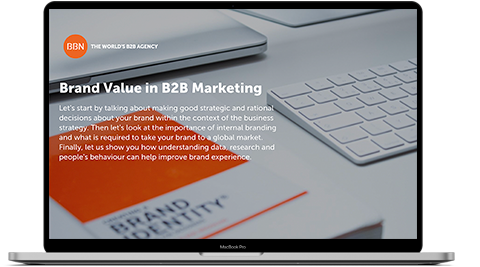Posted by BBN Central on 5th Apr 2024
From Insights to Action: Navigating Data-Driven Marketing
In B2B marketing, the compass that points businesses towards success is increasingly data-driven. Here at BBN, we've been keenly observing
READ MOREPosted by Benedicte Couturier - BBN France on 3rd Oct 2017
In a world where the opinion of our peers, driven by social networks, has become preponderant in our choices, HR communication of authority – which aims to develop the attractiveness of the company as an employer and to valorize it in its dimension of social actor – is no longer enough. Having become suspicious even, it has every chance of being forgotten in favor of a transparent and authentic ’employer brand’s communication.
The goal is simple: beyond your reputation, it’s about reducing the gap between what the company shows before recruitment and what actually happens on the ground, on a daily basis.
The challenge? More than one-third of permanent contracts are terminated within one year – more than 45% of those are under 24 years. And the first reason of rupture is resignation! You have no more time to lose!
“Liberated company, liberated speech”.
Under the impulse of social networks and Millenials in search of commitment, the company is rethinking its organization’s structure: from the traditional pyramidal model that seems to have reached its limits, a new logic emerges with non-hierarchical structures with decentralized power and collaborative functioning. The relationship with the hierarchy is no longer represented as a vertical organization but rather an horizontal structure, thus signifying the end of a double life for employees: adults responsible in their private lives and infantilized at work.
This new ‘liberated’ enterprise promotes initiative, facilitates the emergence of ideas among employees, and thereby frees speech by encouraging employees to be responsible and free to communicate about their company.
In this transformation, employees now have in their hands the keys of the employer brand, thanks to the new tools available to them: social networks of course and company rating sites, with increasing influence. If the Glassdoor site has paved the way, to the point of being nicknamed the ‘trip advisor of recruitment’, other websites are regularly seen such as “meilleurescompanies.com” or Viadeo’s review section that offer anonymous and powerful speaking rooms for employees to rate and comment on companies and their management. Thus, hundreds of contributors’ opinions accessible to all: candidates, competitors, shareholders … are collected every day turning candidates into real investigators who consider that the information disclosed by the company are overall less reliable than from other sources.
In this context, the reputation of the company is played out at every moment and no top-down communication campaign can replace it. The multiplication of spontaneous expressions of the collaborators – for example photos of an internal event posted on Facebook, a tweet on the company leader’s speech, comments on the Glassdoor website – make them true ambassadors of the brand. The best placed finally to relay information … for the worst and the best! Free of any artifice and imbued with absolute (?) sincerity!
From now on, valuing one’s reputation means relying on concrete facts, reflecting the reality of life within the company. In a digital and collaborative system where everyone knows that it is no longer possible to control information, the challenge is to build up its reputation without constructing an artificial image, placing employees at the center of HR policy. Considering that employees are like customers and that to retain them or attract them, it is a human and well-paid ’employee experience’ that must be proposed.
For companies, it is therefore essential to focus on what triggers the pride and the envy of each employee: personal development and evolution, the search for an increasingly strong sense, respect and recognition with the objective of reaching well- being. Without losing sight of the fact that the companies must also think of separation skillfully from its employees: an employer brand is treated as well upstream, during recruitment, as downstream, the Millenials in particular being always quick to share.
I would add that the growing trend of yoga classes, meditation, voluntary projects and the appearance of Chief Happiness Officer within companies should not be alibis for communicating about “happiness at work”, let alone any “fig leaf” initiatives.
To be effective, initiatives must be a reflection of a corporate culture impregnated with benevolence, of a human and empathic management at the heart of the concerns of his team.
From there, the HR manager is responsible for defining his promise as an employer based on sincerity, consistent with the internal working method. In addition to the natural relay of employees on their personal social networks and rating sites, nothing will prevent the communication department from disclosing the backstage of the company based, for example, on testimonials from collaborators. Always paying attention to two key words: transparency and authenticity.
One day … One can imagine that a company proud of what it stands for, serene and concerned about truth, publishes all the opinions of internet users collected on the rating sites, on its own website! The grail of HR communication! Ready to try the experiment?
Posted by Benedicte Couturier - BBN France on 3rd Oct 2017
We've gathered thoughts and expertise from our top strategists to bring you this insightful publication in B2B marketing. Get our e-Book to understand how you can build brand value in your organisation.

1 email a month, EXCLUSIVE stories, and 10 minutes of your time.
Subscribe now
Posted by BBN Central on 5th Apr 2024
In B2B marketing, the compass that points businesses towards success is increasingly data-driven. Here at BBN, we've been keenly observing
READ MORE
Posted by BBN Central on 28th Sep 2023
The addition of communications consultancy solidifies BBN's presence in the Iberian Market. We announce this week that BBN has added
READ MORE
Posted by BBN Central on 19th Sep 2023
The addition of specialist B2B agencies in South America strengthens BBN’s global footprint to further address the marketing needs of
READ MORE
Posted by BBN Central on 14th Jul 2023
On our blog in 2016, we discussed the vital role of a strong brand in B2B markets, and seven years
READ MORE